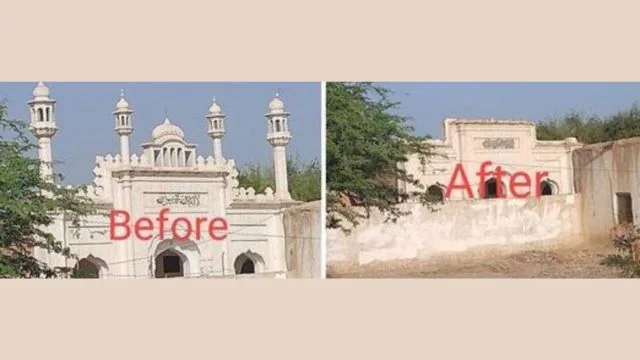The Ahmadi mosque in Khanewal before and after the police attack. Source: International Human Rights Committee.
Despite the numerous denunciations by (mainly) specialist media and human rights activists, the situation of Ahmadi Muslims in Pakistan is still largely overlooked. This allows the continuation of an unbearable persecution, driven by hatred and denial of religious liberty. In fact, mainline Muslims (whatever this expression really means) accuse Ahmadis of heresy and even consider them non-Muslims. Working as a theological justification, while it is in fact a distortion of theology and religion, this excuse perpetrates repression and crimes, the latest of which took place in early October.
Four Ahmadi mosques have been desecrated and vandalized, their domes and minarets being destroyed, in Pakistani Punjab. The International Human Rights Committee, based in Mitcham, Surrey, England, has gathered information and first-hand testimonies.
These four gratuitous aggressions mark a clear escalation, bringing the suffering of Ahmadis to the next level. They have in fact a peculiar aspect. They were directly committed by the Pakistani police and other law-enforcement agencies. Of course, it is not the first time that the complicity or at least the passivity of law-enforcement has been observed in acts of persecution against the Ahmadis, but this time the patency of the events is so astonishing to let everyone conclude that, in the case of Ahmadis, the Pakistani government may not be the solution because it is indeed the problem.
This is not new as well. Since at least 1984, Ahmadi Muslims are living an ordeal that seems to have no end. However, even the most odious and unscrupulous regime needs to keep some sort of feigned decency when committing crimes. On the contrary, today the Pakistani government knows no shame in openly involving its public structures and agents in vicious acts, weaponizing them against a group of law-abiding and peace-loving citizens.
October, the black month
October was a black month for the Ahmadis in Pakistan, beginning with its day one. On October 1, 2024, the Assistant Commissioner of Sangla Hill, a city at some 90 km west of Lahore, headed a large group of police officers and laborers who dismantled parts of a historic mosque in the village of Murd Chak 45, in the District of Sheikhupura. The vandalic operation started after midnight and continued until around 2:30 am of October 2.
Just two days later, on October 4, another extensive group of police officers, dressed in civil clothes, reached 145/10-R Jahanian of the city of Khanewal, Punjab, Pakistan. A police mobile unit and a motorcycle unit were also deployed, patrolling the area. Direct witnesses report that, cloaked in darkness, the police officers in disguise and in uniform repeatedly checked the surrounding places with searchlights to control whether anyone was filming any video. Then the law-enforcement agents acted, demolishing the minarets of the local mosque. They even covered the Kalima, or the formula of the Islamic creed, with cement as it was visible on the walls. Later that day, during a filmed press conference, the president of the Jahanian branch of the Tehreek-e-Labbaik Pakistan islamist political party openly thanked public officials for this crime.

Two aggressions in one night
Just a few days passed, and in the middle of the night between October 10 and 11 the police destroyed the minarets of a mosque in Mohlankay village, in the district of Gujranwala. Around 2:15 am, six agents from the Ahmad Nagar Chatta Police Station ordered the imam of the local Ahmadi mosque to open the gate. When he refused, the police threatened the use of force. At that point, the imam obeyed. The police climbed the stairs and, once they reached the roof of the building, broke down the minarets, gathering the ruins in a trolley. During the aggression, a member of the Ahmadi community was kept in custody in the police mobile unit.
Also in the Gujranwala district, during that very same night, around 1:15 am a group, witnesses say, of ten to fifteen police officers led by the heads of the local security forces arrived at the Ahmadi mosque of the Ghakar Mandi village and asked for the key. They wanted to enter the holy place without any search warrant. When the authorities at the mosque refused, the police officers used a ladder to get up the roof. At the same time, some agents entered the main hall of the mosque, breaking through the door next to the main hall and sat in the corridor. They damaged security cameras and confiscated the DVR as well as the telephones of the imam and his wife. Then the agents closed both ends of the roads leading to the mosque, switched off the lights and destroyed the minarets, once more taking away the debris. They wanted to hide evidence.

Confession of a journalist
Here, the journalist opens his arms and confesses that crimes against Ahmadis’ right to religious liberty are so numerous and frequent that not all of them can be aptly verified, reported, and denunciated. At “Bitter Winter” we do our best to cover as many of them as possible, but sometimes it is simply impossible. Yet what happened in the October in Pakistani Punjab bears the characters of exceptionality, showing the police of a country acting directly against free citizens of that same country: citizens of a country that the police of that country have the duty and responsibility to help and protect, defend, and serve. The catastrophe of Ahmadis in Pakistan is now a state crime—and one openly committed and documented.

